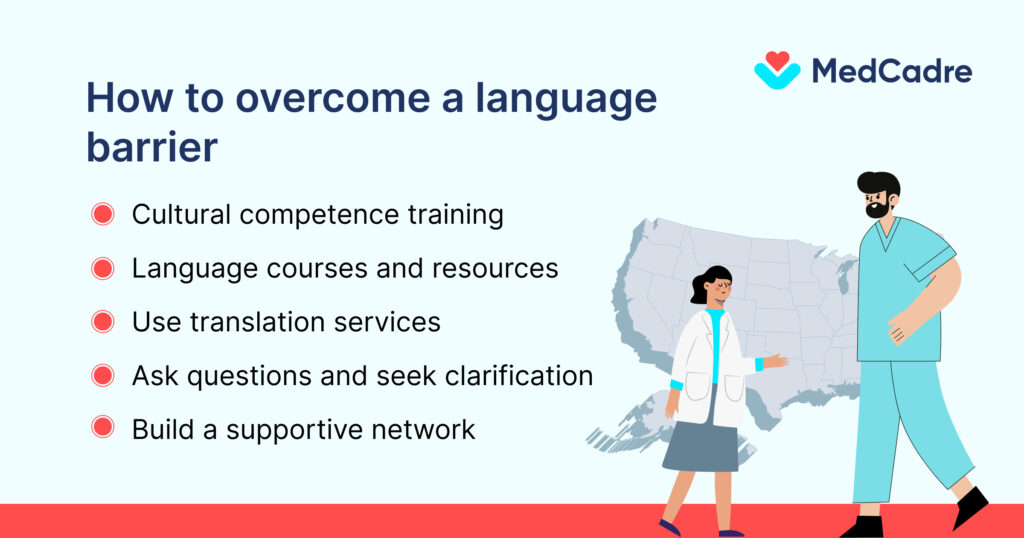Starting a career as a travel nurse can be an exciting and rewarding experience. It offers the opportunity to explore new places, gain diverse clinical experiences, and make a positive impact on patient care. However, one common hurdle that travel nurses often face is overcoming language challenges in unfamiliar healthcare settings.
This article explores the language barriers that travel nurses may encounter and provides valuable tips to help them overcome them.
Language barriers in nursing
Language barriers in nursing can significantly impact the delivery of quality patient care. Effective communication is fundamental in healthcare settings, and when nurses and patients speak different languages or face language-related challenges, it can lead to misunderstandings, misinterpretations of medical information, and compromised patient safety.
This issue becomes particularly critical when conveying complex medical instructions, discussing treatment options, or obtaining crucial patient histories.
Overcoming language barriers in nursing requires proactive measures such as language training, access to translation services, and fostering a culturally competent healthcare environment to ensure effective communication and ultimately enhance the overall quality of patient care.
Below are the language barriers in nursing they face each day while traveling to different countries for their job:
1. Diverse patient population
Travel nurses often find themselves in healthcare facilities with a culturally diverse patient population.
Communicating effectively with patients who speak different languages or have varying levels of English proficiency can be a significant challenge.
2. Medical jargon and terminology
Each healthcare facility may have its own set of medical jargon and terminology.
Travel nurses must quickly adapt to the local vocabulary to ensure accurate communication with colleagues provide quality patient care and help to language barrier overcome.
3. Documentation and charting
Different healthcare facilities may use distinct electronic health record (EHR) systems and documentation practices.
Understanding and navigating these systems efficiently is crucial for maintaining accurate patient records and promoting seamless communication within the healthcare team.
How to overcome a language barrier
Overcoming a language barrier is crucial in various settings, particularly in healthcare, where effective communication is essential for providing quality services.
Here are some key points to help individuals How to overcome a language barrier:

Tip 1: Cultural competence training
Prioritize cultural competence training to enhance your understanding of diverse patient backgrounds.
This can include learning about cultural norms, values, and communication styles to build rapport with patients from various cultural backgrounds.
Tip 2: Language courses and resources
Consider taking language courses or using language-learning resources to improve your communication skills.
Familiarizing yourself with basic phrases in the predominant languages spoken in the area where you are working can make a significant difference in patient interactions.
Tip 3: Use translation services
Accept technology and use translation services, such as translation apps or on-site interpreters, to facilitate communication.
This ensures that crucial information is accurately conveyed to patients and their families, reducing the risk of misunderstandings.
Tip 4: Ask questions and seek clarification
Don’t hesitate to ask questions and seek clarification when faced with unfamiliar medical terminology or documentation practices.
Colleagues are often willing to provide guidance, and seeking assistance early on can prevent errors and misunderstandings.
Tip 5: Build a supportive network
Establish connections with local colleagues, including nurses, physicians, and support staff.
Building a supportive network can help you feel more comfortable seeking assistance when faced with language challenges, and it provides a valuable resource for navigating the nuances of the healthcare environment.
Read more: Travel Nurse Salaries In 2024: What To Expect
Why MedCadre is the right if you seek a job as a travel nurse
MedCadre is one of the leading healthcare staffing agencies in the USA, we help individuals to find the right healthcare industry jobs.
You just need to drop us your resume, or check out the jobs we list each day on our career page- rest hit the apply button, or use “Submit your resume”.
Our dedicated recruiter will analyze your profile thoroughly and if your skills and requirements match the job, we will give you a call for more information.
Conclusion
For travel nurses starting their exciting journey in new places, dealing with language barriers is important to give good care to patients. The challenges come from having patients who speak different languages, using different medical words, and having unique ways of writing down information.
To tackle these challenges, travel nurses can learn about different cultures, take language classes, and use translation tools. Asking questions, seeking help, and making friends with local colleagues also play a big role in dealing with language differences.
MedCadre, as a top staffing agency, makes things easier for travel nurses by helping them find suitable job opportunities. Their recruiters carefully look at each nurse’s skills and match them with the right job, making the job search smoother.
Where good communication is crucial, overcoming language barriers is not just a problem but a chance to grow into a travel nurses. By following these tips- How to overcome a language barrier, travel nurses can have a satisfying career, positively impacting patients and healthcare wherever they go.
Frequently asked question
1. How can nurses help with the language barrier overcome?
- Nurses can assist by undergoing cultural competence training, taking language courses, utilizing translation services, and building supportive networks with local colleagues. Asking questions and seeking clarification on unfamiliar terms are proactive steps.
2. What are some solutions to language barriers?
- Solutions include cultural competence training, language courses, translation services, and building networks. Embracing technology, staying open to learning new languages, and seeking clarification contribute to overcoming language barriers.
3. Why is language important in nursing care?
- Language is vital for effective communication in nursing, ensuring accurate conveyance of medical information, understanding patient needs, and delivering appropriate treatments. Clear communication prevents misunderstandings and potential risks to patient safety.
4. How does language affect nursing?
- Language significantly impacts nursing by influencing effective communication. Language barriers can lead to misunderstandings, compromising care quality and patient safety. Overcoming language challenges is crucial for nurses to navigate diverse healthcare settings and provide optimal care to patients from various backgrounds.


